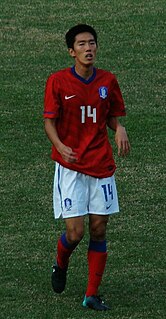
Kim Jung-woo, is a South Korean football player.
The South Korea men's national basketball team represents South Korea in international men's basketball competitions. It is administered by the Korea Basketball Association.
Gwon also written as Kwon is a Korean family name. Some sources list as many 56 clans, but most of them were merged with the Andong Gwon clan under the Sijeung-gong faction soon after the establishment of the Goryeo Kingdom.
Kim Dong-hyeon, Kim Dong-hyun or Kim Tong-hyŏn may also refer to:
Kim Min-woo may refer to:
Joo-hyun (Korean: 주현), also spelled Joo-hyeon or Ju-hyun, is a Korean given name, that is a unisex name. Its meaning differs based on the hanja used to write each syllable of the name. There are 56 hanja with the reading "joo" and 35 hanja with the reading "hyun" on the South Korean government's official list of hanja which may be registered for use in given names.

Ji Hyun-woo is a South Korean actor and musician. He was formerly the lead guitarist for Korean indie rock band The Nuts and is best known for his leading roles in the cable TV series Queen and I (2012) and KBS2 weekend drama Young Lady and Gentleman (2021-22).
Hyun-woo, also spelled Hyeon-woo, is a Korean masculine given name. The meaning differs based on the hanja used to write each syllable of the name. There are 42 hanja with the reading "hyun" and 60 hanja with the reading "woo" on the South Korean government's official list of hanja which may be registered for use in given names. Hyun-woo has been a popular name for baby boys in South Korea for more than two decades, coming in third place in 1988 and fourth place in 1998. In 2008, a total of 1,943 baby boys were given this name, making it the third-most popular name that year.
Hyun-jung, also spelled Hyun-jeong, or Hyeon-jung, Hyeon-jeong, Hyun-jong, Hyon-jong, Hyon-jeong is a Korean unisex given name, predominantly feminine. The meaning differs based on the hanja used to write each syllable of the name. There are 42 hanja with the reading "hyun" and 84 hanja with the reading "jung" on the South Korean government's official list of hanja which may be used in given names. Hyun-jung was the second-most popular name for baby girls born in South Korea in 1970, falling to tenth place by 1980.
Sung-hyun is a Korean unisex given name, predominantly masculine. Its meaning differs based on the hanja used to write each syllable of the name. There are 27 hanja with the reading "seong" and 35 hanja with the reading "hyun" on the South Korean government's official list of hanja which may be registered for use in given names. Sung-hyun was the fourth-most popular name for baby boys in South Korea in 1990.
Woo-sung is a Korean male given name. The meaning differs based on the hanja used. There are 42 hanja with the reading "woo" and 27 hanja with the reading "sung" on the South Korean government's official list of hanja which may be used in given names.
Kim Hyun-soo is the name of:
Hyun-jin, also spelled Hyeon-jin or Hyon-jin, is a Korean given name. Its meaning depends on the hanja used to write each syllable of the name. There are 35 hanja with the reading "hyun" and 43 hanja with the reading "jin" on the South Korean government's official list of hanja which may be registered for use in given names.
Jong-hyun, also spelled Jong-hyeon, is a Korean masculine given name. Its meaning differs based on the hanja used to write each syllable of the name. There are 19 hanja with the reading "jong" and 25 hanja with the reading "hyun" on the South Korean government's official list of hanja which may be registered for use in given names.
Hyun-soo, also spelled Hyun-su, is a Korean unisex given name. Its meaning differs based on the hanja used to write each syllable of the name. There are 35 hanja with the reading "hyun" and 67 hanja with the reading "soo" on the South Korean government's official list of hanja which may be registered for use in given names.
Events from the year 1986 in South Korea.
Kim Ji-hyun may refer to:
Shi, also spelled Si, or Shie, Shee, Sie, Sea, See, is an uncommon Korean surname, an element in two-syllable Korean given names. As given name meaning differs based on the hanja used to write it. There are 54 Hanja with the reading "shi" on the South Korean government's official list of hanja which may be registered for use in given names.
This page is based on this
Wikipedia article Text is available under the
CC BY-SA 4.0 license; additional terms may apply.
Images, videos and audio are available under their respective licenses.

